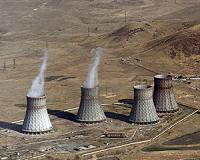 |
Vienna (AFP) March 14, 2011 The crisis at Japan's earthquake-damaged nuclear power plant is "unlikely" to turn into a new Chernobyl, which was the world's worst nuclear accident, the UN atomic watchdog said on Monday. "Let me say that the possibility that the development of this accident into one like Chernobyl is very unlikely," Yukiya Amano told a news conference at the headquarters of the International Atomic Energy Agency in Vienna. The current crisis at the Fukushima nuclear plant was caused not by human error or a design fault, as in the case of Chernobyl in Ukraine in 1986, but by a "huge natural catastrophe beyond imagination," Amano said. In addition, the reactors at Fukushima had been automatically shutdown when the earthquake hit, so "there is no chain reaction going on," the IAEA chief said. Furthermore, the Chernobyl reactor did not have a reactor vessel, while Fukushima does "and that reactor vessel is still contained" even after two explosions there, he said. The "design is different and the structure is different. Based on this, it is very unlikely that Fukushima would develop into an accident like Chernobyl," Amano said. The IAEA also said it has no indication at the current time of a possible meltdown at the quake-hit nuclear reactors. "We have no indication of fuel that is currently melting at this point," said James Lyons, director of the IAEA's Safety at Nuclear Installations division. The current situation was "very dynamic... (but) given the information we have, we have not been told that at this point," the expert said. Amano said that Japan has officially asked the IAEA to send a team of experts to help in the current nuclear crisis. It had not yet been decided the exact nature of the assistance the watchdog would provide, or when, he said. "The areas that we can provide assistance are radiation surveillance, environmental sampling, medical support, recovery of missing or misplaced radioactive sources and advice on emergency response," he said. "It will be discussed in the coming days and weeks." As soon as the massive earthquake hit Japan on Friday, damaging the Fukushima nuclear plant located 250 kilometres (160 miles) northeast of Tokyo, the IAEA made a formal offer of assistance to the government. Japanese-born Amano described the 8.9-magnitude quake and the devastating tsunami it triggered as "a tragedy of cataclysmic proportions. This has been one of the greatest natural disasters of modern times, the full extent of which is still becoming clear." The events of the last few days were "truly unprecedented," Amano continued. "The modern infrastructure of a highly industrialized country has been dealt a devastating blow by the immense destructive power of nature. I send my deepest condolences to the people and government of Japan." The giant nuclear plant of Fukushima was damaged by the quake, with two explosions hitting separate reactor units there. But "the reactor vessels have held and radioactive release is limited," Amano insisted. In Brussels, the EU's energy commissioner Guenther Oettinger called on the IAEA to convene an extraordinary meeting of member states "to take stock of the situation" in Japan. The idea was also to "organise a coordinated response and initiate a reflection on the possible implications for nuclear safety" following Japan's nuclear emergency, Oettinger's office said. The commissioner has called a snap meeting in Brussels on Tuesday of EU energy ministers, national nuclear safety officials and big nuclear companies to look at safety measures in Europe. Some 150 reactors are scattered across the continent in half as many nuclear power plants -- some located in seismic areas. Amano said he had not received Oettinger's letter, but it was not up to him to decide, but rather the IAEA member states. "Whether we have a special meeting of member states or not, that's up to the member states to decide," he said. But as far as he was concerned, he thought member states would find a planned daily briefing useful, which would be held starting from Tuesday, Amano said.
Share This Article With Planet Earth
Related Links Nuclear Power News - Nuclear Science, Nuclear Technology Powering The World in the 21st Century at Energy-Daily.com
 Nuclear contamination: The options
Nuclear contamination: The optionsParis (AFP) March 13, 2011 Evacuation, temporary shelter and iodine pills are the chief weapons for protecting civilians against nuclear fallout, experts say. A blast on Saturday that wrecked the concrete shell surrounding the No. 1 reactor at Japan's Fukushima nuclear plant released radioactive vapour but not at levels dangerous for human health, according to Japanese officials. Specialists say the authorities ha ... read more |
|
| The content herein, unless otherwise known to be public domain, are Copyright 1995-2010 - SpaceDaily. AFP and UPI Wire Stories are copyright Agence France-Presse and United Press International. ESA Portal Reports are copyright European Space Agency. All NASA sourced material is public domain. Additional copyrights may apply in whole or part to other bona fide parties. Advertising does not imply endorsement,agreement or approval of any opinions, statements or information provided by SpaceDaily on any Web page published or hosted by SpaceDaily. Privacy Statement |